Two Point Hospital is the first of many throwback sims, say its creators
Two Point County will be "our 'Little Springfield'," says Two Point Studios.
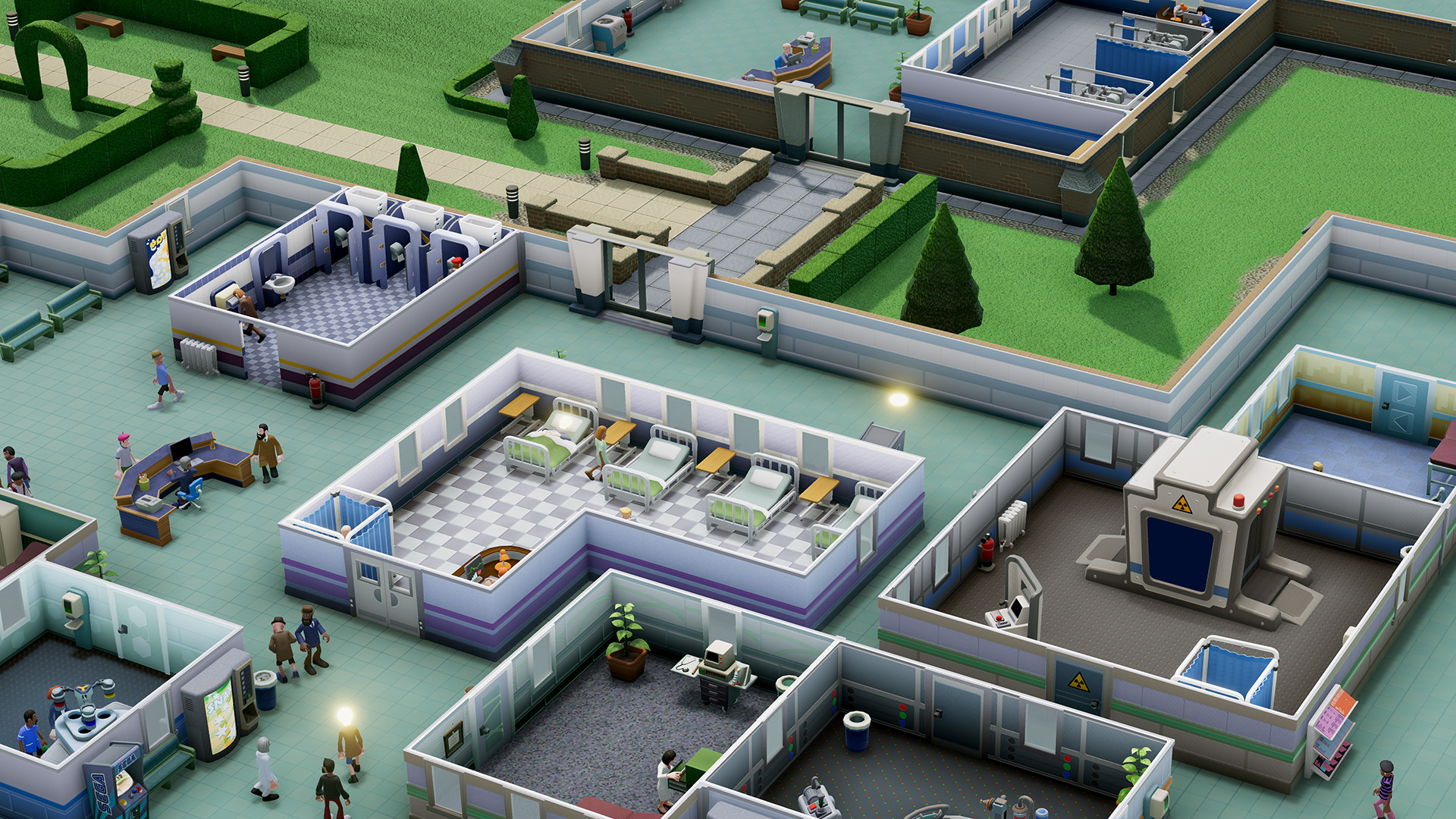
Announced this week, Two Point Hospital is a new management sim from the creators of Theme Hospital. Its developer, Two Point Studios, is comprised of Bullfrog and Lionhead veterans, and while playing up to nostalgia promises a "completely new game" in its own right.
It's been 21 years since the beleaguered patients of Theme Hospital were first diagnosed with Bloaty Heads, Third Degree Sideburns, Slack Tongues and worse. I caught up Two Point Studios to find out what's changed in that time, and what the future holds for the devs' debut venture.
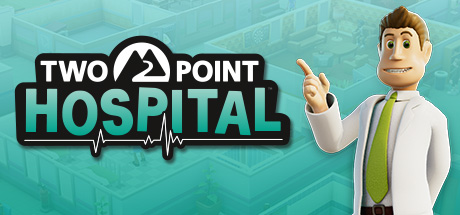
Two Point Studios was founded in 2016 by Bullfrog and Lionhead veterans Mark Webley and Gary Carr. Two Point Hospital marks the developer's first project and is a modern throwback to 1997's Theme Hospital. Here, we chat to the veteran duo, alongside other ex-Lion Head-ers Ben Hymers and Ben Huskins.
A Theme Hospital successor? Tell us everything we need to know about Two Point Hospital.
Mark Webley: Well, it’s everything you imagined it would be and more [laughs]. Gary and I have been talking about coming back to these Bullfrog-esque games for a long time. When we did Theme Hospital, we had ideas for Theme Prison, Theme Resort. We went our separate ways and kept talking about getting back together.
Gary Carr: When we went our separate ways it was nothing mysterious. When Bullfrog was bought by EA it was just the time to move on. We just parked that ambition for 20 years. With Black and White, and with Fable we had two pretty big franchises out of Lionhead. We parked making sims for a while, did The Movies, and Ben Huskins was a big part of that.
We don't like to think of it as a spiritual succession to Theme Hospital as such, we like to think of it as a thing in its own right—something new and different. Thematically, of course, there are similarities, but we're making a completely new game. This isn't a reskinning of something we've already done.
Webley: The values are the same, the humour is important. Theme Hospital had its own quirky off-centre, offbeat take on the sim genre. It didn't take itself too seriously, but under the hood there was actually quite a deep sim.
The biggest gaming news, reviews and hardware deals
Keep up to date with the most important stories and the best deals, as picked by the PC Gamer team.
As you say, Theme Hospital had some deep management elements, but it’s remembered for its Bloaty Heads, Slack Tongues, and King Complexes. What can we expect on the illness and disease front here?
Ben Hymers: It's still going to be very much about the humour and still won't take itself too seriously. That's been one of our core principles from the start. I think we want to separate ourselves from some of the more dry simulation games that are out there, and while they're great, we're never going to be able to make a completely serious game.
Webley: There have been a few hospital games since Theme Hospital, but [they’ve] certainly missed the point of not taking themselves too seriously. I mean, medicine and illnesses are, well they’re not much fun, really. You don’t want to dwell on that. We certainly have a lot of interesting illnesses. One of the illnesses in the trailer is Light Headedness—that started as the idea of a bulbous head and it went from there.
Ultimately it’s been a really fun thing to get involved with again, it feels like we’ve gone back to the good old days of Bullfrog.
Gary Carr
Carr: To be honest, all of just created a list of ideas. Often it’s just a play on words and often it’s turning something into a bit of a pun. And then you think of a visual for the pun.
Hymers: Camel Toe, for instance. That’s my favourite one.
Carr: Stop saying that. Anyway, sometimes you come up with the cure before you have the illness, it’s weird, and other times it’s the other way around. If we like the ideas, the ones we start to talk about more start to get worked on by the team. That’s the way we go about it: if we get a bit of banter in the office, then it’s more fun to work on.
Webley: I think if it makes us laugh, we know we’re onto something. And that’s how it was 22 years ago.
Carr: We’ve tried to do that again, we’ve tried not to be overly process-driven and let the ideas come out where we riff around them. This makes the studio more involved, it’s not waiting on one person to be the visionary, and actually when we pull all of our ideas—Two Point has a lot of experienced people, some people have worked with us for over 20 years, so why wouldn’t we utilise their minds?
Ultimately it’s been a really fun thing to get involved with again, it feels like we’ve gone back to the good old days of Bullfrog.
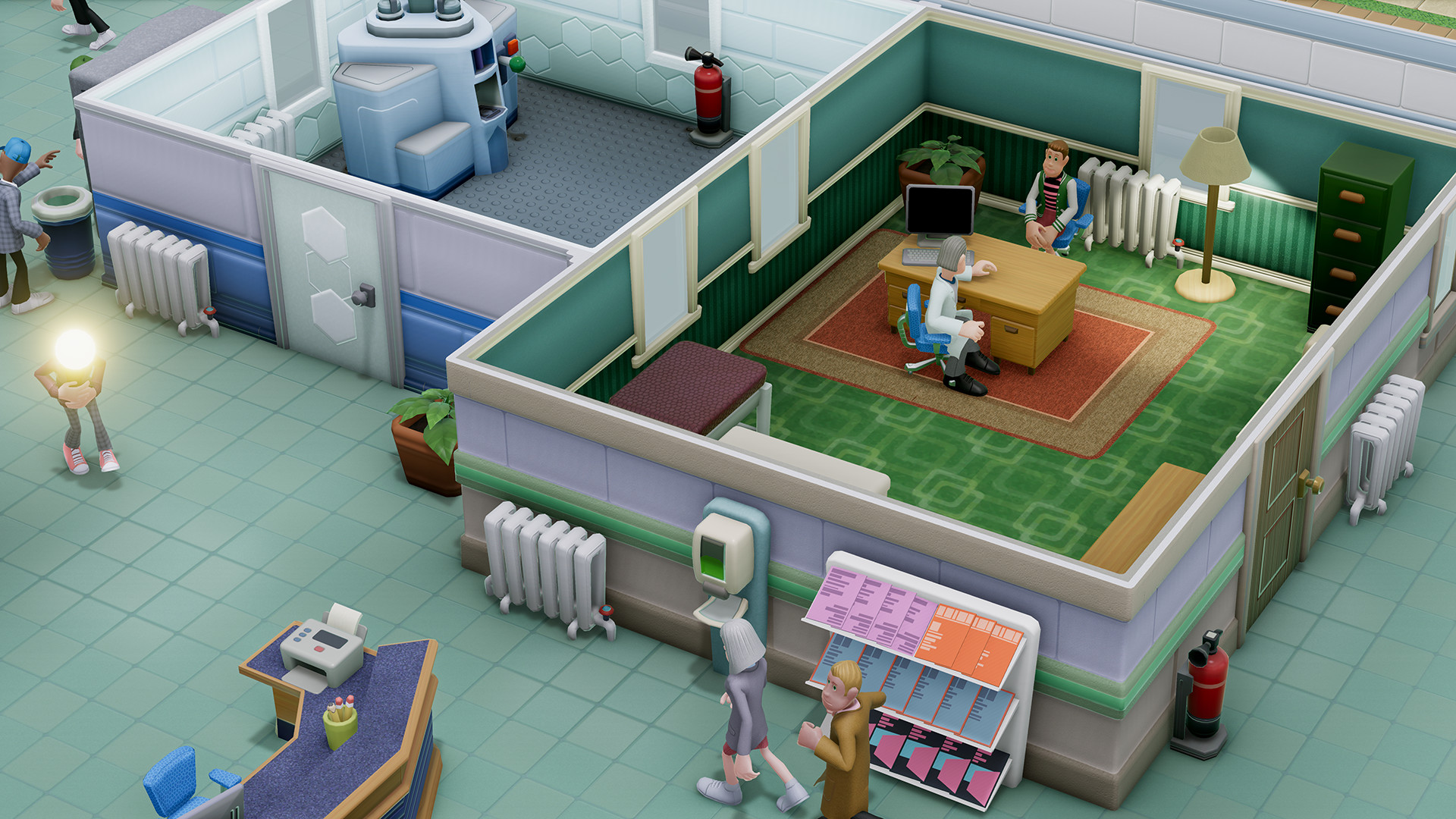
I imagine a big draw for Two Point Hospital will be nostalgia. But what modern considerations have you had to deal with here?
Webley: One of the big things when we started is the look and feel of it. Theme Hospital, even now, has got a nice charm to it. Visually it’s dated, but it hasn’t dated as much as other things that were around at that time. A lot of things that entered into 3D haven’t necessarily fared as well.
Carr: If I remember rightly, Edge magazine came in to do a preview at the time and were quite honest about it. They said it felt a bit old school, even then, doing it isometric pixel art. We were doing Dungeon Keeper at the same time and that was in a new 3D engine and looked really shiny and exciting. In a sense we kind of looked dated then, but weirdly it kind of looks better now over the 20 year period than the games we were working on in the studio at the same time. It’s aged better.
One of the things we’ve tried to do is think: Right, it’s very difficult to future-proof it, but we’ve tried to come up with a style, rather than use the technology to put it in its time. We’ve went for a claymation style, which doesn’t date as much as some other rendering styles, so we’ve kept it kind of simple and clean.
I think it’s important to do that as well because if you’ve got 60 or 70 characters on screen, you don’t want too much noise and detail because it can quickly become too messy. Hopefully it won’t age too much, but you never know. Hopefully the gameplay will carry us through.
It’s also got a semi-procedural nature to it. You do feel like the game’s characters are aware of each other—they turn and look at each other and gesture to each other, You couldn’t do that in the original game, everything was baked and hand drawn. And as nice as that is, there’s only so many variations you do with that. Now the characters do feel more alive and we want to do that, we want you to care about your staff and patients as much as possible, rather than seeing them as little units that you’re just trying to get through the system.
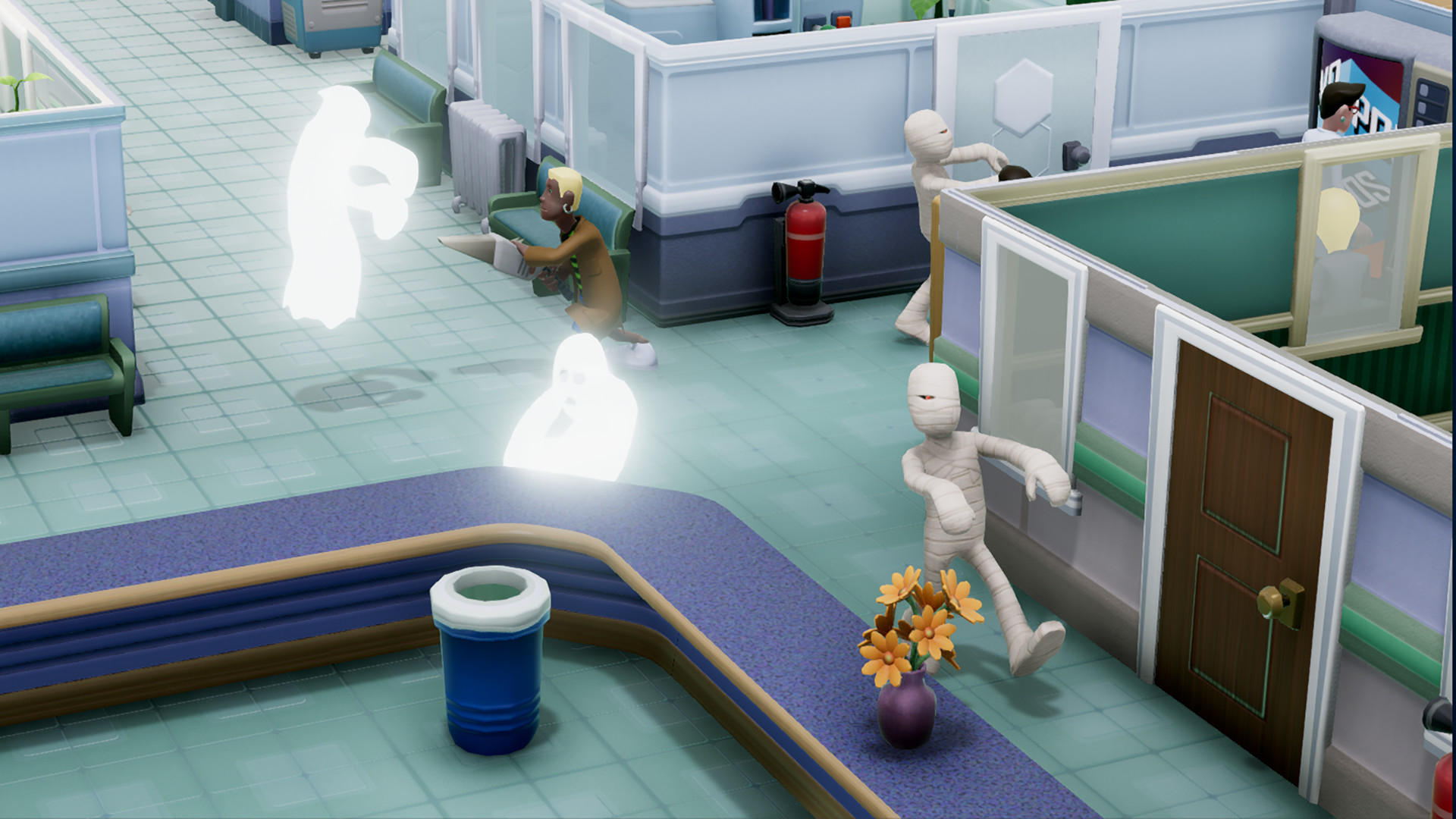
What about online and modding support—Theme Hospital predated the same level of community access players have today, how will Two Point take advantage of this?
Hymers: I've thought a lot about modding from a technical perspective. On launch we're not going to have modding because it's hard and I need to think about how to do it, but yeah that's something we aim to do in an update later. It's in the plan.
Ben Huskins: That was one of our core pillars early on was to think about online, because it's such a common thing these days. Our approach to online is to think of it as creating a bit of a social feel to the game, and basing that on asynchronous play. We're very aware of the fact that a lot of people play their simulation games as single-player experiences and don't want to have to feel the influence of other games. Our approach is that it's very much something that you opt into - if you're into, you can get involved on that side of it as much as you want to.
One of the things that we're putting in is competitive multiplayer challenges where you're playing the game as you would usually, but will start one of these challenges. There might be a bunch of different ones, like: how many patients can you cure in the next 12 months? Or how attractive can you make your hospital in the next half year?
You'll keep track of your progress in that time period. If your friends have played that challenge already, their data will be stored on the cloud, and you can get this sense of playing at the same time as you. This was influenced by the ghost racing feature that appeared in old arcade racing games.
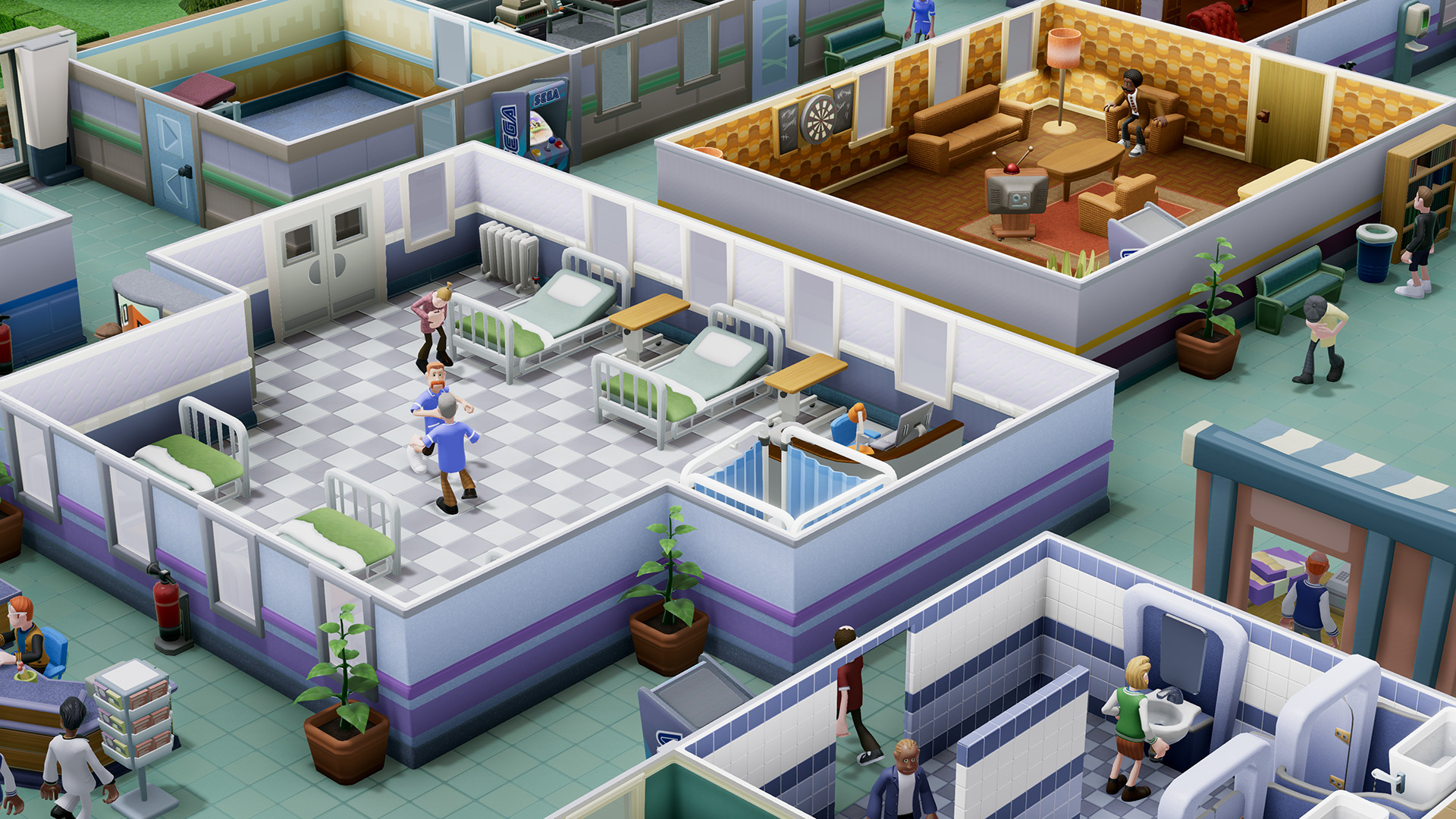
Beyond Two Point Hospital, what does the future hold for Two Point as a studio—have you thought that far ahead?
Carr: This isn’t just us doing a reimagined version in the same theme, this is one of many simulation themes that we’re going to put in our Two Point County—which is the world we set our game in. We’re planning more than just this, we’ve got a plan to do more ideas, that kind of interweave together. That’s something for the future.
Webley: In some ways it’s quite nice to set up a company and say: This is what we’re going to do, a la Bullfrog titles. This is the first of our ‘Little Springfield’, as you like to put it Gary.
Speaking of Bullfrog and Lionhead games, would you be open to revisiting and/or remaking the likes of Dungeon Keeper and Black and White?
Carr: I don’t think Mark and I can take much credit for Dungeon Keeper, that’s Peter’s baby. Mark had a lot more to do with Black and White.
Webley: It’s probably not in the right vein for what we want to do. I think in Two Point County, we’re imagining a number of businesses and little sims that interact with each other. We can see a road map ahead of us and exactly what we’re going to do next is a bit up in the air at the moment.
Carr: Yeah, we’re hoping to build this rich sim world and this is the first step towards that. And we can’t do that in a half-measure by jumping off and doing another one of our older games, so we need to really get behind this idea.

